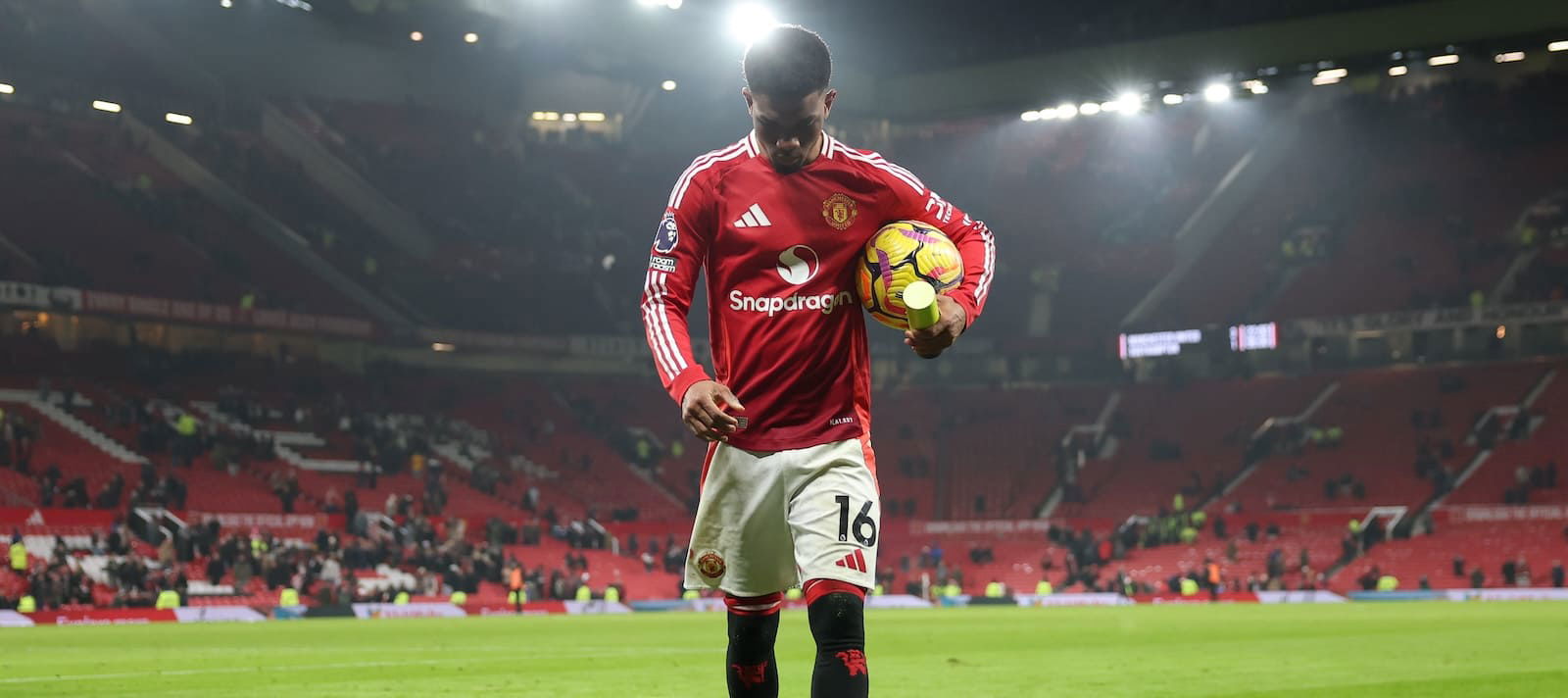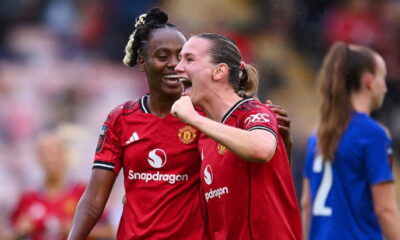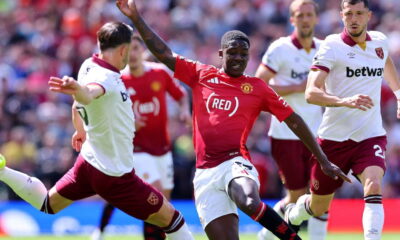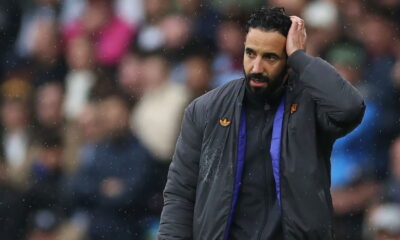
1
A host of factors decide whether a manager will prove a success at a top club.
From tactics and systems, to transfers and sales, right through to personality and a healthy dose of luck (or lack thereof), the manager of a footballing behemoth like Manchester United needs to strike an almost perfect balance between each area of their control to succeed.
The alternative is to suffer the same fate as previous incumbents of the role – a long line of coaches who enjoyed great success elsewhere only to succumb to the same cycle of misery which has consumed Old Trafford in the post-Sir Alex Ferguson malaise.
Fresh from unrelenting success in Lisbon, Ruben Amorim arrived in Manchester in November to replace Erik ten Hag amidst a wave of positivity and fanfare. The tenth coach since Ferguson’s retirement appeared finally the right man for the job, possessing the personality and philosophy to steady a sinking ship, and correct its course back towards the summit of English football.
But that proved ambitious at best – or a delusion at worst.
Amorim oversaw United’s worst season in the Premier League era, finishing 15th in the table with record lows for points, position, goals scored and a record high for losses. Early exits from the Carabao Cup and FA Cup were surpassed only by the dismal 1-0 defeat in the Europa League final to Tottenham Hotspur, a strong contender for the worst European final in living memory.
However, the Portuguese has remained largely immune from criticism for his role in this collapse. A long line of perpetrators, including Ten Hag, the players, INEOS, the Glazers and even the fanbase, have endured greater accusations of blame for their part in last year’s disastrous campaign.
Amorim has been as close to a free pass as a coach could possibly hope to receive at a club with the magnitude and pressure of Manchester United.
Despite the failings on the pitch, the 40-year-old coach has received enormous backing from INEOS off it, with over £200 million spent securing him a new front line – comprising Matheus Cunha, Bryan Mbeumo and Benjamin Sesko -with further recruits in goal and midfield also being lined up.
As a result, there will be no place for Amorim to hide this season. No free pass to play and avoid criticism. If United produce anything resembling the abject performances of last season, he will quickly become the tenth victim of the unrelenting managerial scythe at Old Trafford.
And while it may be myopic to boil Amorim’s chances of success or failure down to a single factor, Amorim’s dogmatic tactical approach – employing a 3-4-2-1 system – and his choices in the transfer market mean the former Sporting manager’s use of a a single United player will define his tenure at Old Trafford.
How Amorim deploys Amad this season will decide whether he is the Manchester United manager next summer or not.
Focus on the forwards
At Amorim’s request, United have dedicated the bulk of their summer budget to the misfiring attack.
The Red Devils produced a dismal 44 league goals last season – only Everton and three relegated sides, Leicester City, Ipswich Town, and Southampton scored fewer.
No United player reached double figures in the league while the senior striking partnership of Rasmus Hojlund and Joshua Zirkzee combined for just seven league goals, despite costing over £100 million in transfer fees across successive windows.
It’s evident, therefore, why the trio of Cunha, Mbeumo and Sesko – forwards who combined for 48 league goals between them last season – have been signed, with each player expected to become a key part of Amorim’s front three.
Neither Hojlund nor Zirkzee are capable of leading the line for United. The club are banking on Sesko, the 22-year-old Slovenia international courted by half of Europe’s elite prior to his move to Manchester, being the centre-forward Amorim was so desperate for and so obviously needed at Old Trafford.
On the left, Cunha has been given the number ten shirt in Rashford’s stead, with the 27-year-old Academy graduate shipped off to Barcelona on loan after falling out with Amorim. Alejandro Garnacho, the young Argentine winger who played this position most often last season, will also be sold after falling similarly foul of Amorim’s standards as well. The need for Cunha – a Brazil international who has thrived as the left-sided number ten in a 3-4-2-1 with Wolves – was obvious.
Which brings us to the third Musketeer in Amorim’s new look attack, Mbeumo.
The Brentford forward enjoyed the best campaign of his career last season, returning 20 goals and eight assists for the Bees. He has played as a striker, a number ten, a winger, and even a wing-back under Thomas Frank at the Gtech Community Stadium and possesses a potent pairing of physicality and pace, with an excellent attitude and work-rate.
Mbeumo was an obvious target for any top Premier League club, with Arsenal, Chelsea, Newcastle and Spurs all registering interest in signing the 26-year-old – but he only had eyes for Old Trafford, another green flag to United’s pursuit.
So why is this the signing that causes this writer the most angst? Why is a Premier League proven attacker with a glowing record on and off the pitch, who has dreamt of wearing a Red shirt since he was a boy and rejected United’s rivals, a transfer that may make or break Amorim’s tenure?
Because, unlike for Sesko or Cunha, Mbeumo is taking the place of an existing player who genuinely was good enough to start in that position in Amorim’s system. He is taking the place of Amad.
Wingback or the bench?
Alongside Bruno Fernandes, Amad was a rare ray of light amidst a sea of misery at Old Trafford last season.
The Ivorian winger offers a level of technical ability that few, if any, of his teammates are capable of producing. He is an absolute delight to watch on the ball, capable of turning fullbacks inside or out, or both, as he dances towards the opposition box.
Despite missing around three months with a serious ankle injury sustained in February, he returned eight goals and eight assists in the league.
But Amad does not allow his skill to carry him through games; rather, he excels off the ball as much as he does with it, demonstrating a tireless work rate and unrelenting pressing out of possession. This commitment to the defensive side of the game may come at his detriment, however.
If United had not signed Mbeumo, Amad would almost certainly be playing as the right-sided number ten this season. But the arrival of the Brentford talisman will likely see the 22-year-old dropped deeper into the wing-back role – a position Amorim has trusted him in before, owing to his work rate and intelligence in defence.
This is not necessarily a negative.
Amorim’s system depends upon the wing-backs to provide a constant threat down their respective channel, offering an overlap on the outside of the number ten ahead of them and always being fed the ball. The combination of Amad and Mbeumo is as tantalising a prospect for United fans as it is scary for the left side of an opposition defence to contend with.
But this requires Amorim to place his unflinching faith in Amad as a defender as much an attacker, even when United face – as they will later this afternoon against Arsenal – a strong opponent, the type which a manager will be tempted to play conservatively against.
If Amorim’s system is to succeed, with the choices he has made in the transfer market, he cannot afford to be negative and drop Amad to the bench in favour of a ‘stronger’ defensive option at right wing-back, such as Diogo Dalot, when a top team comes to town.
If he does, United are not maximising the £71 million investment on Mbeumo as they already had an excellent option in that position, while areas of the team – in goal and midfield to be precise – go untouched due to a lack of funds created by the focus on upgrading the forward line.
United will almost certainly line up against Arsenal with Andre Onana in goal and Casemiro or Manuel Ugarte in midfield. Neither of these prospects are positive ones, and they are driven by the decision to have Mbeumo in the same team as them, rather than different players instead of them.
Amorim chose to upgrade the attack this summer. If he tilts towards defence throughout the season, this will prove his undoing – and its his use of Amad, be it at wing-back or from the bench, which will prove fundamental to whether he can successfully walk this precarious tight rope, or fall as each one of his predecessors has before him.
Follow us on Bluesky: @peoplesperson.bsky.social













